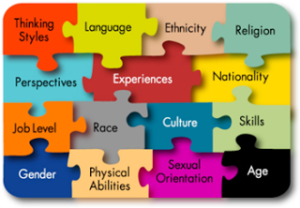How to gain a competitive edge by embracing diversity and fostering inclusive cultures.
Diversity has become increasingly important for organizations to compete in the continually changing global marketplace of today. Diversity at work is no longer just a catchphrase; it is now a strategic imperative that encourages creativity, boosts output, and creates a positive workplace environment. Organizations may unleash the potential of their staff and gain a competitive edge by embracing diversity and fostering inclusive cultures.
In today’s dynamic global marketplace, diversity has emerged as a pivotal factor for organizations striving to remain competitive. Beyond being a mere catchphrase, diversity at work has transformed into a strategic imperative, fueling creativity, enhancing productivity, and fostering a positive workplace atmosphere. By embracing diversity and cultivating inclusive cultures, organizations can tap into the full potential of their workforce and gain a distinct edge in the market.
Recognizing the varied backgrounds and perspectives of their employees, companies can harness a wealth of unique viewpoints and abilities. Diverse teams have been proven to be more innovative, adaptable, and imaginative, leading to cutting-edge solutions and dynamic problem-solving. In valuing diversity, businesses open doors to a myriad of fresh ideas that fortify decision-making processes and enable agile responses to evolving market trends.
In essence, diversity serves as a catalyst for blending different viewpoints and challenging conventional wisdom, igniting a culture of innovation within organizations. Embracing this diversity not only fosters growth and new opportunities for the company but also creates an environment where employees feel valued, respected, and motivated. As a result, higher employee engagement and productivity emerge, nourished by a sense of belonging that fuels loyalty and job satisfaction.
To capitalize on the benefits of diversity, organizations must proactively promote inclusivity through inclusive recruiting, equal advancement opportunities, diversity and inclusion training, and the formation of employee resource groups. By embracing diversity and holding themselves accountable for promoting inclusion, businesses can unlock the true potential of their workforce and thrive in today’s diverse and interconnected world.
Diversity has many different aspects, including those related to race, ethnicity, gender, age, sexual orientation, skills, and others. The strength of diversity is found in the distinctive viewpoints, experiences, and abilities that people from various backgrounds bring to the table. It has been seen that diverse teams are more inventive, flexible, and creative. By valuing diversity, businesses may access a variety of unique views and ideas that improve problem-solving, solidify decision-making, and boost flexibility in response to shifting market dynamics.
The true power of diversity lies in the richness of distinct viewpoints, experiences, and abilities that individuals from diverse backgrounds bring to any situation. When people with different life experiences and perspectives come together, they contribute a wide range of ideas and solutions, fostering innovation and creativity. This diversity of thought enables teams to approach challenges from multiple angles, leading to more robust problem-solving and decision-making processes.

Embracing the strengths that diversity offers allows organizations to tap into a wealth of untapped potential, driving growth and success in an ever-evolving world.
Diverse teams thrive on the blending of various points of view, challenging established wisdom and igniting creativity. When people from different backgrounds work together, they bring a wide range of experiences, cultural quirks, and problem-solving methodologies, leading to one-of-a-kind and cutting-edge solutions. Organizations that value diversity promote an innovative culture that can expand a company and create new opportunities.
Higher employee engagement and productivity result from fostering an inclusive atmosphere where everyone feels appreciated and respected. Employees are more likely to be motivated, devoted, and willing to go above and beyond when they feel included and recognized for their distinctive contributions. A sense of belonging is fostered in inclusive workplaces, and this increases loyalty and job satisfaction.
Diversity at work has benefits that extend beyond the workplace; it is essential to an organization’s capacity to interact with a variety of clientele. Understanding and reflecting the variety of diversities is crucial for businesses to succeed in an increasingly international world. Diverse teams have the cultural competency and insights necessary to create goods, services, and marketing plans that appeal to a broad spectrum of consumers. Organizations may better understand and satisfy the demands of varied markets by embracing diversity, which will boost consumer loyalty and expand the market.
Companies must actively promote inclusive workplaces if they want to profit from diversity. This entails putting inclusive recruiting procedures into place, ensuring equal opportunities for advancement, providing diversity and inclusion training, forming employee resource groups, and tracking development regularly. Setting the tone, exhibiting inclusive behaviors, and holding themselves accountable for promoting diversity and inclusion are all important leadership tasks.
Workplace diversity is more than just a box to check; it is a force for transformation that drives firms to succeed. Businesses can leverage the potential of other viewpoints, spur innovation, improve employee engagement, broaden their market reach, and build thriving workplaces by embracing diversity. Organizations that give diversity a high priority and inclusion will be better prepared to face the challenges of a diverse and interconnected world as we move forward, placing themselves as industry leaders.
Blog Writer:
Navreet Kaur
Young Business growth accelerator, badgefree





